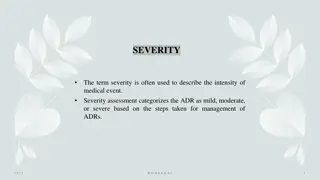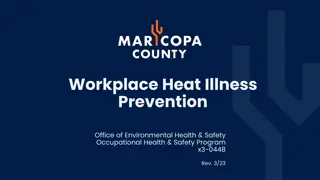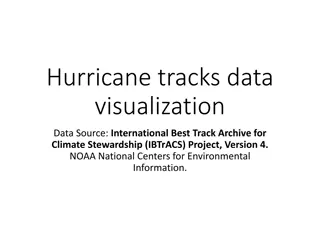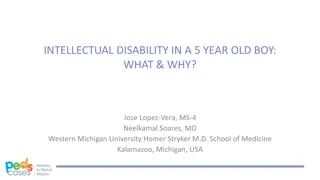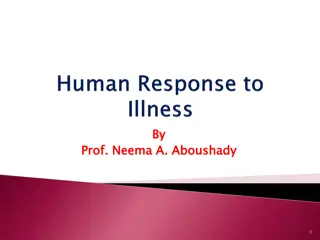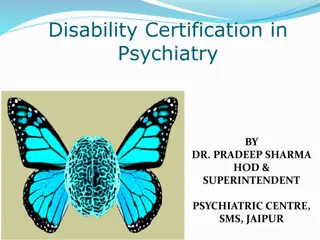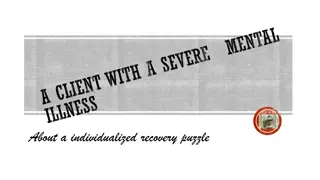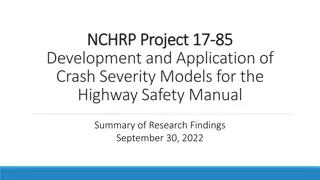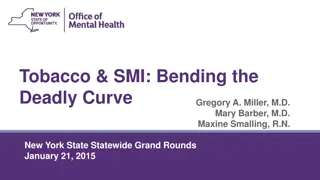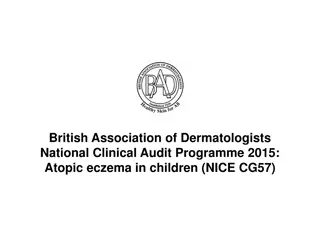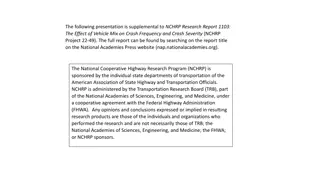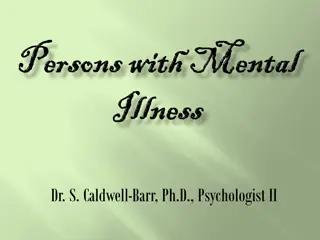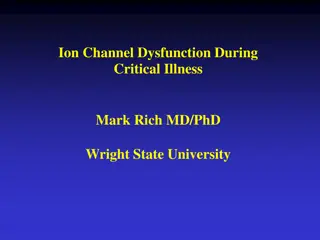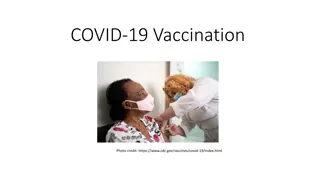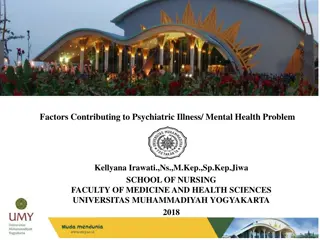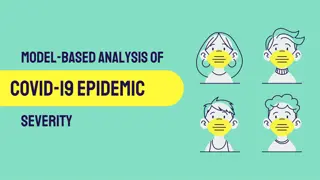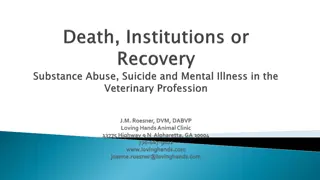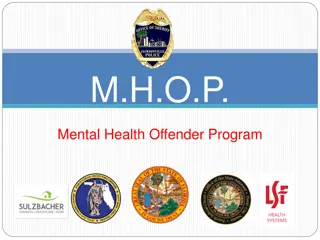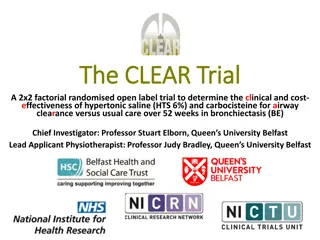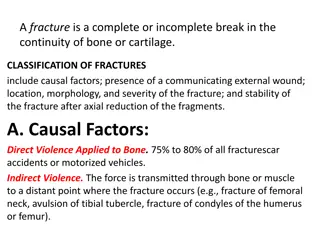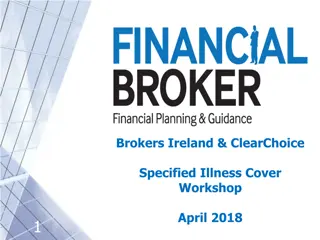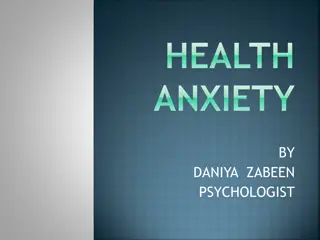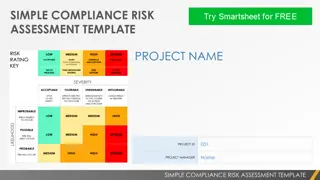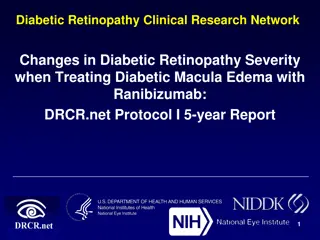The History of NAMI and the Family Movement
Founded in 1977 by two mothers seeking support for loved ones with mental illness, NAMI (National Alliance on Mental Illness) has grown to be a leading grassroots organization advocating for mental health awareness, support, and education. The Contra Costa chapter, NAMI CC, has a rich history of pro
1 views • 15 slides
Severity Assessment in Adverse Drug Reactions
The concept of severity assessment in adverse drug reactions (ADRs) categorizes the intensity of medical events into mild, moderate, severe, or lethal categories based on the required management steps. Various classification systems such as Karch and Lasagna, as well as modified Hartwig's and Siegel
4 views • 10 slides
The Natural History of Disease Development and Prevention
The natural history of disease development outlines the progression of a disease in an individual without intervention, from exposure to outcome. Learning objectives include defining prevention terms, understanding disease severity, prevention levels, and intervention measures. Studying disease prog
4 views • 16 slides
Mental Health vs. Mental Illness
Explore the nuanced differences between mental health and mental illness, where mental health pertains to the quality of mental and emotional wellbeing for everyone, while mental illness refers to diagnosable conditions with long-term effects that do not affect everyone in the same way. Gain insight
10 views • 18 slides
Workplace Heat Illness Prevention Program Overview
This workplace heat illness prevention program overview discusses risk factors, how the body handles heat, types of heat illness, prevention strategies including water consumption and shade, importance of acclimatization, emergency response procedures, OSHA standards, job and personal risk factors,
0 views • 28 slides
Overview of Acute Cholecystitis: Diagnosis, Severity Grading, and Treatment
Acute calculous cholecystitis is a common digestive disease with varying treatment perspectives. The Tokyo Guidelines 2018 provide criteria and severity grading for the diagnosis of acute cholecystitis. Diagnosis involves local and systemic signs of inflammation along with specific imaging findings.
1 views • 18 slides
Visualizing Hurricane Tracks and Severity Over 40 Years
Explore hurricane track data from 1981 to 2021 sourced from the International Best Track Archive for Climate Stewardship. The visualization includes maps showcasing hurricane frequency, maximum severity by Saffir-Simpson scale categories, and trend indices. Follow the evolution of hurricane patterns
0 views • 18 slides
Intellectual Disability in a 5-Year-Old Boy
This case study discusses the diagnosis and severity of intellectual disability (ID) in a 5-year-old boy, distinguishing between developmental delay and ID. It covers the importance of genetic testing, particularly in cases like Fragile X syndrome, as well as the evolution of assessing ID severity b
0 views • 21 slides
Atopic Eczema in Children and Its Management
Atopic eczema is a chronic inflammatory skin condition in children with varying severity. Proper management is crucial to reduce its impact on a child's life. Identifying triggers, assessing severity, and implementing a stepped treatment approach are key in managing this condition effectively.
0 views • 15 slides
Donor Mapping for GBV Activities in the DRC
This report delves into the magnitude and severity of gender-based violence (GBV) in the Democratic Republic of the Congo (DRC) in recent years. It highlights the methodology used in data collection, key results, and leveraging findings for advocacy. The report also outlines the objectives of the ma
1 views • 19 slides
Nursing Strategies for Emotional Reactions to Illness
In this content, the focus is on understanding the stages of illness and the crucial role of nurses at each stage. It also highlights the patient's emotional needs during illness and the importance of maintaining a positive self-image. Nursing strategies for assisting patients in coping with anxiety
0 views • 8 slides
Autism Spectrum Disorder: Overview and Assessment
Autism Spectrum Disorder (ASD) is a lifelong neurodevelopmental condition that affects social interaction, communication, and behavior. The spectrum includes a range of characteristics, from highly verbal individuals to non-verbal ones. Various disorders fall under the ASD umbrella, with different l
1 views • 14 slides
Management of COVID-19 in Acute Care Setting in Antigua and Barbuda by Dr. Sneha Shanbhag
This presentation by Dr. Sneha Shanbhag, a consultant internist at Mount Saint John's Medical Centre in Antigua, outlines the COVID-19 management strategies in the acute care setting. The presentation covers case severity breakdown, hospital admission guidelines, therapeutic management for mild to s
0 views • 10 slides
Managing Physical Health in Severe Mental Illness with a Focus on Diabetes
This educational material presents a comprehensive slide set designed to aid in the management of physical health in individuals with severe mental illness, focusing on diabetes. It includes insights on the challenges faced by healthcare professionals, learning objectives on diabetes management, and
0 views • 14 slides
Innovative Approaches for Individualized Recovery in Severe Mental Illness
Embracing the recovery model for individuals with severe mental illness entails moving away from traditional approaches and focusing on values, shared decision-making, and community support. The hierarchy of needs profiles different levels of specialized services, while measurements include wellbein
0 views • 8 slides
Chronic Primary Mitral Regurgitation: Evaluation and Management Considerations
Chronic primary mitral regurgitation (MR) presents various considerations in evaluating severity, symptoms, left ventricular function, and candidacy for mitral valve repair. The management decision involves assessing imaging findings, LV function, and the impact on mortality and quality of life. Sur
0 views • 9 slides
Involuntary Commitment Criteria for Adults with Serious Mental Illness
Involuntary commitment for adults with serious mental illness is a sensitive issue that involves specific criteria to determine if someone poses a danger to themselves or others. The criteria include having a serious mental illness, being a threat to self or others, or having an inability to provide
0 views • 67 slides
Development of Crash Severity Models for Highway Safety Manual
Research findings from NCHRP Project 17-85 focused on assessing current HSM approaches for crash severity prediction, identifying gaps, developing new severity models, and creating guidance for model application. The study introduced distinctive methodologies like Quasi-induced Exposure and Ordered
0 views • 19 slides
The Impact of Tobacco Use on People with Serious Mental Illness
People with serious mental illness are significantly affected by tobacco use, with smoking being a leading preventable cause of early death in this population. This presentation highlights the reasons behind smoking in individuals with mental illness, challenges faced in cessation efforts, and the i
0 views • 12 slides
Analysis of Atopic Eczema in Children: A National Clinical Audit Program
The British Association of Dermatologists conducted a national clinical audit program in 2015 to evaluate atopic eczema in children based on NICE guidelines. The audit included contributions from BAD and BSPD members, as well as private providers. It involved 128 submissions from 98 centers, with 12
2 views • 18 slides
Impact of Vehicle Mix on Crash Frequency and Severity
The supplemental presentation to NCHRP Research Report 1103 explores the influence of vehicle mix on crash frequency and severity. It highlights the project background, objectives, completed tasks, key deliverables, implementation strategies, and considerations for the Highway Safety Manual. The pro
0 views • 43 slides
Mental Illness and Disability Rights
This content provides insights into commonly held attitudes and beliefs about mental illness, the American with Disabilities Act of 1990, definitions of mental illness per NRS 433A.115, and interactions with individuals with mental health issues. It also covers misconceptions, the 72-hour hold for m
0 views • 60 slides
Ion Channel Dysfunction in Critical Illness
An intriguing case study presents a young male with weakness and coma in the ICU following pneumonia and sepsis. Nerve conduction results indicated critical illness myopathy and polyneuropathy, along with cardiac abnormalities. Reduced muscle excitability was attributed to a sodium channelopathy. Th
0 views • 14 slides
COVID-19 Vaccination: Importance, Types, and Effectiveness
COVID-19 vaccination is crucial in reducing the likelihood of infection, severe illness, and spread of the virus. Almost everyone over 6 months should get vaccinated, except those with severe allergies to vaccine components. The Pfizer-BioNTech, Moderna, and Novavax vaccines are safe and effective.
0 views • 14 slides
Crime Statistics and Severity Analysis: RCMP Sooke Detachment
An overview of crime severity measurements, property crime rates, and violent crime rates in Sooke and comparable detachments. The data includes crime severity index scores, crime type contributions by year, and property/violent crime rates per 1000 population. The analysis shows changes over time,
0 views • 8 slides
Factors Contributing to Psychiatric Illness and Mental Health Issues
Factors contributing to psychiatric illness and mental health problems include predisposing factors such as psychological and biological factors, as well as precipitating stressors like challenging stimuli. Mental health is defined as a state of well-being involving happiness, contentment, and effec
0 views • 15 slides
Software Defect Management
Defects in software arise from various causes such as miscommunication, lack of experience, human factors, and poor testing skills. Different types of defects can be classified based on severity, work product, type of error, and status. Severity-wise classification includes major, minor, and fatal d
0 views • 30 slides
Prediction of Liver Fibrosis in NAFLD Patients: Impact of CAP Values
Steatosis has emerged as a significant diagnosis with NAFLD becoming a common cause for hepatologic evaluation. Liver stiffness measurement (LSM) using transient elastography is vital for assessing fibrosis severity in NAFLD patients. However, the accuracy of LSM can be influenced by obesity and sev
0 views • 35 slides
Insights into COVID-19 Epidemic Severity Analysis
Clinical studies and model-based analysis provide evidence and categorization of COVID-19 severity, symptoms, and risk factors. Severity stratification shows the distribution among tested patients, highlighting the attack rate and vulnerable populations. Studies aim to estimate severity accurately f
0 views • 33 slides
Legal Ramifications of Mental Illness in Criminal Justice System
Mental illness presents complex challenges in the criminal justice system, impacting court rulings, constitutional issues, and perceptions of vulnerability. Cases like James Holmes and John Hinckley highlight the intersection of mental health and criminal behavior. Legal standards regarding executio
0 views • 9 slides
The Intersection of Addiction and Mental Illness in Veterinarians
Explore the profound impact of addiction and mental illness on veterinarians, highlighting the biological and environmental components, the prevalence of serious mental illness, the challenges in seeking mental health help, and the heightened risk of suicide within the veterinary profession. Promote
0 views • 28 slides
Gamifying Vulnerability Reporting for Coordinated Disclosure at Microsoft Security Response Center
Christa Anderson, a Senior Security Program Manager at Microsoft's Security Response Center, discusses the importance of gamifying vulnerability report data to encourage coordinated disclosure. The MSRC Top 100, announced at Black Hat USA, plays a crucial role in the public credit strategy by recogn
0 views • 13 slides
Mental Health Offender Program: Addressing Mental Illness in the Criminal Justice System
A pilot program, M.H.O.P., aims to reduce the burden on the criminal justice system by providing pretrial release, personalized care plans, and court supervision for defendants with mental illness. By addressing the needs of the mentally ill, the program strives to break the cycle of criminal behavi
0 views • 21 slides
Pharmacovigilance Guidelines for Clinical Trials in Bronchiectasis Research
The CLEAR Trial is a 2x2 factorial randomized trial evaluating the effectiveness of hypertonic saline and carbocisteine for airway clearance in bronchiectasis patients. The trial, led by Professor Stuart Elborn and Professor Judy Bradley, focuses on pharmacovigilance activities, adverse event defini
0 views • 20 slides
Near Real-Time Flood Inundation Mapping Using Sentinel-1 Data During Hurricane Florence
A study by Shen, Xinyi and colleagues from the University of Connecticut has developed the RAdar Produced Inundation Diary (RAPID) algorithm for near real-time flood inundation mapping using Synthetic Aperture Radar (SAR) data from Sentinel-1 during Hurricane Florence. The analysis revealed large in
0 views • 8 slides
Fractures: Classification and Factors
A fracture is a break in bone continuity, classified by causal factors, presence of external wounds, location, morphology, severity, and stability post-reduction. Fracture causes include direct violence, indirect violence, bone diseases, and repeated stress. Fractures can be closed or open, with sev
0 views • 17 slides
Enhancing Advising Process for Specified Illness Cover Workshops
Guidance on developing a structured process for advising on Specified Illness Cover, addressing challenges faced by financial brokers in selling and positioning the product. Workshop objectives include client engagement, research, explaining benefits, and product understanding. The content covers ag
0 views • 53 slides
Health Anxiety: Causes, Symptoms, and Impacts
Health anxiety, also known as illness anxiety or hypochondria, is characterized by obsessive worry about having a serious medical condition. Individuals with health anxiety misinterpret minor body sensations as symptoms of a severe illness, despite reassurance from medical professionals. This condit
0 views • 16 slides
Compliance Risk Assessment Template Project Report
This project report presents a simple compliance risk assessment template along with post-mitigation judgment, risk severity, risk level, mitigations, warnings, and remedies. It includes information on communication controls, risk severity levels, acceptability judgments, likelihood assessments, and
0 views • 5 slides
Long-Term Effects of Ranibizumab Treatment on Diabetic Retinopathy Severity: DRCR.net Protocol I 5-Year Report
Phase 3 trials have demonstrated favorable changes in diabetic retinopathy severity in eyes treated with ranibizumab for diabetic macular edema. This study focuses on the 5-year outcomes of ranibizumab therapy in managing diabetic retinopathy progression, especially with decreasing exposure to anti-
0 views • 24 slides

